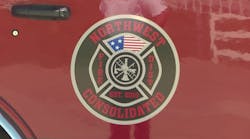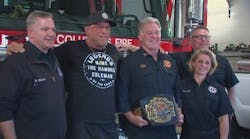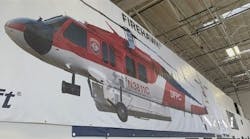Let me once again state the painfully obvious to you. Food is a critical element of life. Without nourishment, we would soon wither and die. That's right my friends, food is a life or death proposition. Of course those of you who really know me would suggest that I would be among the last to perish. Sorry to say, I guess you are right about that one. However, I want to make a much stronger point about food with this commentary.
The impetus for this commentary came to me as I listened to Scott Brown, our senior pastor at the Colts Neck Reformed Church, discuss a pivotal moment with the Bible that revolved around a meal. This fall's sermon series is being built upon the importance of meals within the history of the Bible. As I was listening to Scott my mind began to wander (as it often does) from the Bible to the fire service. I began to jot down a series of notes about how I have seen meals within the context of fire department operations for more than 40 years now.
Think about it my friends. How many times has the success or failure of your organization revolved around a meal? If your experiences mirror mine in any way, you will find that the importance of food permeates more places than you might think. Let me suggest a few reasons to you that I believe will stress the importance of meals to your organization:
- A number of your fund-raising efforts revolve around food.
- Social events involving food can be part of your membership appreciation effort.
- You sometimes take a person out for a meal to thank them.
- Sometimes your planning sessions are built around a meal (or series of meals).
- Sometimes you express joy in the form of a meal.
- Sometimes you express sorrow in the form of a meal.
- From time to time, you and the members of your fire department bond in the presence of a nice meal.
In each of these examples, the meaning of the meal becomes a part of the message. It is up to you to understand this and to utilize the meal in an appropriate manner. Unfortunately, far too many people in the fire service today seem to have forgotten the importance of the meal in their department. In the slap-dash hubbub of today's world, people have begun to forget the meaning of the meal within their organizational life.
Since we can all agree that food is an essential element of life, let me now take this concept of the importance of meals to a different level. If food is a staple of human life, is it not then possible that food can become an important element in the life of a fire department? I believe this to be the case. Further, let me suggest that if we forget the importance of food to our organizations, we risk exposing them to irreparable damage.
Here in the Adelphia Fire Company, food and fund-raising are an important part of our annual calendar. We hold pancake breakfasts, spaghetti suppers, and old-time country barbeques. Each year we come together around a food-based theme to help us meet the financial needs of our fire company. I also see this as part of our team-building effort. Our fire company comes together as a team to create the fund-raising opportunity. Food, friendship, and financial reward are a very good combination within my world.
This food and fund-raising phenomenon is not limited to Adelphia. I have been to chicken dinners, turkey dinners, roast beef dinners, and oyster fry suppers over the years. In many places, these form a critical element within the fund-raising structure of the fire departments wherein they are held. So as you can see, the meaning of the meal in these places is important indeed. No fund-raising can mean that there will be no fuel to run the apparatus, and no equipment to carry on the fire trucks. In situations like these, it is critical to remember the meaning of the meal when the time comes.
Another reason for breaking bread revolves around the annual fire department dinner which is a tradition of long standing in many places. Our dinner here in Adelphia is held during the first part of March each year. At the dinner, we swear in our officers, celebrate the service of our members, and say thank you for the many years of service which our members have given. Last March my daughter and I received Top-10 Responder awards for our service during 2008. So it goes in my world. We say thank you with a meal.
As a matter of personal preference, I use food as a part of my business modus operandi. I learned this particular lesson from some really knowledgeable people. Through the years there were a number of organizations which ran major events with a largely volunteer staff. Hard work was rewarded with food and friendship. To a young lad growing up in the fire service, this seemed like an excellent way to rally people together around a common cause. Some of my best friends come from that era of nutritional interactions.
I have made it a long-standing practice to say thank you to people with whom I have worked by taking them out to a good restaurant and say thank you with a meal. It has been my experience that people like to hear the words thank and you used together as a comment on their service. However, I find that when those words are combined with a meal, they carry a bit more staying power. At least that is how I have seen that in my life. It is also my practice to send gifts to a number of folks with whom I do business on a regular basis during the Christmas season.
Let me now return to the days of yesteryear when I labored in the vineyards of the Newark Fire Department. The firehouse meal was a staple of our daily lives in the firehouses of the city. It was the time when all of us in the station came together to break bread and tell war stories. It was a time for people like Jerry Knight, Bernie Washington, Tom Grehl, and Jack Doll to strut their stuff. There were others of course, but these guys were the "gold standard" in my life.
I can still recall the meatloaf dinner that Bernie created for my last meal as a fireman at the old Engine Company #11 station on Central Avenue. The gang from Engine 11 and Truck 11 was there, as was my Battalion Chief and my Deputy Chief, as well as their aides. It was a real sweet time to be a fireman in the City of Newark.
As a matter of fact, I was able to develop a team-building program around my quarterly Sunday Brunch sessions at Engine Company #27 where Tom Grehl was the station commander. I would have Tom host the sessions in his station, since it was one of the largest in the city. The cost of the meal came from my pocket, but Tom and the gang at his station would prepare for the morning's festivities. I could then bring the entire battalion together for a training session, wrapped around a truly scrumptious Sunday brunch.
In this way, I could lay out my policies and procedures and everyone would be hearing the same things. A number of my associates thought I was foolish to lay out the money for these sessions. It was my contention that it was money well spent, because it allowed for the whole team to train together and then enjoy the rewards of their labors, viz. a great meal prepared by Chef Grehl.
Of course I have been reasonably assured that the firehouse meal still holds a central place in the firehouse of Newark. As a matter of fact, it was my privilege to be an invited guest back in 2007 for the dinner celebrating my brother's last night as the chief in Battalion Four, Tour 3. Let me assure you that the folks in charge of that meal shall carry a place in my heart. Frankly folks, it is tough to believe that I have been retired from the city for more than a decade.
There are many other examples from everyday life where meals serve an extremely useful function. When there is a death, we tend to come together around a dinner table. I cannot recall the number of repasts which I have attended during my time here on earth. And when there is illness, we come together and share our bounty with those who need the comfort of a well-cooked meal. My apologies to the ad agency which coined the phrase, "...Nothing says loving like something from the oven."
To this day, my volunteer fire company here in Adelphia wraps many of its functions around the concept of food. We dine after our monthly meetings. We share a bite to eat after our drills, and we recover from the hard work and danger of the fireground with food to fill our stomachs. We also get to shoot the bull and tell war stories during these times of friendship and camaraderie.
We even have a policy in place which allows the fire company and the lady's auxiliary to provide food for the families and friends of members who pass on to their reward. We look at this a final way of saying thank you to the people who have given so much to the fire department during their lifetimes.
These are the many reasons for sharing a meal which I have been privileged to share during my life. However, I now see a new mood within the fire service. It is a mood which bothers me. It is a mood which gives me pause to worry about the future of our fire service. Sadly, it has been my misfortune to encounter a number of selfish, one-way street people who want nothing to do with the people who wish to come together around the table and share their thoughts, their ideas, their ideals, and their meals.
There are also those who avoid certain meal-related functions because they do not wish to associate with other people. That this can happen in the fire service is a really sad commentary on direction that our field of endeavor is taking. Let me suggest that it is a sad commentary indeed when you cannot sit down and break bread with your associates.
There have been many occasions during my time in the fire service (military, career, and volunteer) when the supper table served as a source of healing and rejuvenation. Then again, this is a new world wherein we are living. It is a world marked by fractionalization and segregation into warring camps. Let me strongly suggest that there is nothing good which can come from this type of 'my way or the highway' interaction. There are very few absolutes in life my friends.
Let me suggest something to you. When we as a fire service start to forget the meaning of the meal, we are entering upon a slippery slope that does not lead in a positive direction. We need to come together and share the collective ideas which can lead to a brighter future for us all. And the best place to do this is around a table that is covered with a solid, sustainable supply of sustenance.
Try it. You'll like it.
HARRY R. CARTER, Ph.D., CFO, MIFireE, a Firehouse.com Contributing Editor, is a municipal fire protection consultant based in Adelphia, NJ. Dr. Carter retired from the Newark, NJ, Fire Department and is a past chief and active life member of the Adelphia Fire Company. He recently published Leadership: A View from the Trenches and Living My Dream: Dr. Harry Carter's 2006 FIRE Act Road Trip, which was also the subject of a Firehouse.com blog To read Harry's complete biography and view his archived articles, click here. You can reach Harry by e-mail at [email protected].





